#perhaps Sargon
Explore tagged Tumblr posts
Text
You don't get it, do you? You're flesh. It's a beautiful thing. You think you're like me, some incorporeal whisp who can only observe and ponder and occasionally haunt, occasionally make my voice heard. But you, you can still do so much more. I beg you, take advantage while you can: hug. Taste. Feel the warmth of your beloved, of the thawing sun, feel the cold when you reluctantly leave your blankets. You are not a mere observer; you can act and interact and make others react, you can do good or ill. What a privilege to be embodied!
#sayeth a Wanderer#perhaps Sargon#perhaps the ikiryo man himself#Ennead#WED#WED 11#writing every day#writeblr#writers on tumblr#writing#booklr#bookblr#worldbuilding#Wanderer#fantasy#trans#transgender#i spend so much time hating my body#i'm trying to do better
8 notes
·
View notes
Text

The girls are fiiiightiiiingggg!!
Sourced from/inspired by:




(Pausanias, Description of Greece 2.22.3 / Diodorus Siculus, The Library of History 4.74.4 / Dictys of Crete, Journal of the Trojan War Book 1 / Suda.)
Perhaps doesn't seem rightly fair that Ilos threw Pelops out for crimes only his father committed, but, in fairness, Pelops later does this:

(Apollodorus' Bibliotheke, 3.12.6)
Notes: -The sceptre/staff of the Trojan royal family is inspired by a snippet in Aristophanes' Birds where a character notes that Priam had a bird-topped sceptre in another (probably Euripidean) play, plus that eagles were a clearly favoured image/emblem among Hittites and royal power, alongside that it's Zeus' bird (and Zeus is their divine progenitor). The huge sphere of lapis lazuli was added as an inference to Troy's wealth. -I had to adjust the "emblem" from Mycenaea's gate, since I didn't have the space to have the lionnesses stand on an altar. Since the gate itself has lost the lion heads (I read somewhere they were probably separate pieces), and I stumbled upon the Lion Gate in Hattusa, I used them as a basis for the lionnesses' heads. I think it fits, as a reference back to the Anatolian origins of the family. (Thus, of course, that lionnesses decoration on top of the gate in Mycenae would only have been added when Atreus became king.) -I didn't dress Pelops and Agamemnon in red tunics to match/contrast with the purplish-blue of the Trojans because in Mycenean Greece red doesn't seem to be something men wear. - The Royal Hats (lol) should probably be more rounded than conical, but idc. -The braid-with-bun look that Tros (and Hektor, when I draw him) wears is based on that one artefact of Naram-Sin (earlier thought to portray Sargon), because I really like it. Even if it's from way earlier and much too far east haha.



#greek mythology#the iliad#tagamemnon#tantalus#pelops#agamemnon#tros of troy#ilus of troy#priam of troy#lightart#trojan family
45 notes
·
View notes
Text
At Trump's inauguration today, Elon Musk did a Nazi salute. Or an awkward gesture. Or it was because of Asperger's. I've included quotes made about the video first, then the video at the end.
The Anti-Defamation League (ADL), the civil rights organization formed to combat antisemitism and that works with the US government and institutions, has recently been in conflict with Wikipedia.
In June of last year, Wikipedia's editors marked the ADL as unreliable in matters concerning Israel or Palestine, given its pro-Israel stance.
Yesterday, following arbitration, Wikipedia banned certain editors for spreading antisemitic rhetoric.
After Musk's salute/gesture today, the ADL posted:

... edge. In this moment, all sides should give one another a bit of grace, perhaps even the benefit of the doubt, and take a breath. This is a new beginning. Let’s hope for healing and work toward unity in the months and years ahead.
The Newsweek editor Batya Ungar-Sargon, formerly progressive, but having shifted somewhat lately, and who is publishing this book:

Posted this:

This man has consistently boosted literal Nazis on his site, through his algorithm and payments and actually by responding and retweeting! He's a friend to Israel, which gives him a pass for everything else. You'll see that happen often, that conservatives who are pro-Israel and also antisemitic are praised for the first part and ignored on the second.
Am I blaming the antisemitism itself on Zionists? No. But are watchdogs and institutions allowing a scary amount of right-wing behavior because their focus is on criticizing anti-Israel sentiment? Well, see for yourself what the gesture he does twice is.
#I mean also see how the ADL has been treating musk and trump for the last year#elon musk#donald trump#batya ungar-sargon#adl#media bias#us politics
43 notes
·
View notes
Text
Specter: "Have you seen Swordfish? I had some questions regarding the roster for the deployment tomorrow, best to get those inquiries done and settled before showtime, and all that."
Skadi: "I think I saw her with doctor Kal'tsit, they were going towards the dormitories together... Probably her room."
Specter: "Oh, wonderful, then I get to ask the two head honchos about it instead of just the left side of the brain, should make matters more simple."
Skadi: "Hey, now, wait a second, Laurentina. I said to slow down. Surely you don't mean to interrupt them?"
Specter: "Interrupt what? A strategic meeting? I dare think I have a voice in such sundry matters as much as anyone who is ordered to take cannonfire to the face in her duties on a nigh daily basis. The value I can add to any given conversation is not to be understated, my little Orca."
Skadi: "I'd consider that a complaint, where it to come from the mouth of anyone except you, Shark. But seriously, think about it a little... The two of them, alone, not in any of the meeting rooms or the offices, but rather in the dormitories. You can add those twos together with ease."
Specter: "Surely you jest, Orca? Are you suggesting that I could be so uncouth as to intentionally, naively, brazenly sling open the doors to the realm of intimacy between two entangled, probably very sweaty souls? Non-sense! I so confidently stride because I know that's not even a possibility!"
Skadi: "Elaborate. And seriously, slow down."
Specter: "Those two old wells haven't seen a trickle of moisture in years, I'd reckon. They are all-business, no non-sense, well oiled chaste tactical machines! Young, dumb and full of cum? Try old, cold, and full of mold! And I love them so, but let us be real for a microsecond, my little Orca, can you truly picture Swordfish and Miss Kal'tsit doing the Sargon Speedbump? Or the Laterano Excommunication? Perro Style? Get real, dearest, they are more likely to be playing checkers than they are to be making Bolivar Pancakes in there. And she's absolutely in there, reeks of that seawater with a tinge of warmth so characteristic of her behind this door."
Skadi: "First of all, never say any of those words ever again, but you're right, it smells like the Captain in there. There, past that door, with a plaque that very clearly reads 'Kal'tsit'. Let's, perhaps, mind our own business and just field your questions tomorrow early."
Specter: "You truly are insistent on these fantasies of yours, Skadi! It's so cute and endearing how you think that could even be possible! Ahem... Pardon, Swordfish, Miss Kal'tsit, I've got some inquiries regarding tomorrow's sortie that I was hoping to--"
*Specter opens the door and has a full frontal VIP seat peep at Gladiia running her hands deep inside of Kal'tsit's dress, half-lidded red eyes staring back at the intruding shark, straddling the doctor with her lithe yet strong frame, a cougar that's not yet had enough of its meal. The silence is filled only by greedy little gasps seeking to oxygenate two hearts that have very clearly not have had enough of each other just yet, an almost primal hunger in the two pairs of eyes that glared guillotines at the interloper, deafeningly silent yet clearly inquisitive as the trails of saliva that connected their lips lost its tension and threatened to snap*
Specter:

Skadi: "Hm. So, I tried to warn her, but--"
Specter: "Orca, look! Isn't it gallant, isn't it inspiring? Swordfish is hard at work, making a younger sibling for me! Oh, how splendid!"
Skadi: "LAURENTINA!"
Specter: "Oh, how simply joyous! Observe! Swordfish fully intends to cultivate that moist, fertile delta, and from it shall life spring! Orca, we'll care for a brave new Hunter soon, we must be on our best behavior and be good influ--"
Skadi: "With your pardon!"
*Skadi secures the interloping shark with a deft armlock and beats a hasty yet perfectly gallant retreat, closing the door behind her in such a hurry that the entirety of the landship shook. Many a Messenger on-board would remember this as the Localized Earthquake of 1099, which would go on to prompt emergency preparations for a sudden Catastrophe overnight, but that is a story for another time. Back in the dormitory room, as the younger Hunters exfiltrated themselves from the battlefield that was that room, after a cautionary yet eternal few minutes of silence and stillness, just in case that door decided to open again, the senior Hunter dismounted the doctor.*
Kal'tsit: "...Well? So what was that about?"
Gladiia: "My sincere apologies, Dame Kal'tsit, and you have my gratitude for having gone along with my drastic, sudden strategy."
Kal'tsit: "Don't worry about it. So?"
*Gladiia nods and, from a little corner behind Kal'tsit's bedside cupboard, carefully drags out a small table with a checkers board on it. The game is clearly quite progressed, with one side having a clear advantage.*
Gladiia: "I did not want Shark to see me, as some land-dwellers would put it, 'getting bodied' so badly in this showdown of ours."
Kal'tsit: "Because she would never let you hear the end of it?"
Gladiia: "Not for a couple of lifetimes, no."
Kal'tsit: "You have my sympathy and understanding, don't worry about it. Now..."
Gladiia: "...Yes. It's about time I reverse my fortune. Ready yourself, Dame Kal'tsit."
*Kal'tsit then proceeded to win the next game, as she did the previous seven, and they played lots more checkers afterwards*
305 notes
·
View notes
Text
The next part of my pollfic! You guys got me with a tie last time. I tried my best!
Previous.
(Edited to actually put the poll in, sorry about that.)
.
For a moment, Danny was paralyzed by indecision. Who should he go to? Who should he help? But then he remembered that this wasn’t a combat situation. He could help both, one at a time.
There were, perhaps, some negative side effects from spending his formative years as a ghost as a superhero and satisfying his Obsession through combat. It was very unfortunate. Useful in combat! Less so at other times.
But he should ask the large man first, or else by the time he finished translating for the attendant he might be done. He inched closer, hovering so he could actually see what the man had spread out on his table.
His heart sank when he saw clay tablets and papyrus scrolls covered with the tiny, black squiggles of Coptic.
Danny knew a fair amount of Akkadian cuneiform. While Pandora tended to focus on the immediately and practically applicable when it came to language lessons, Clockwork had a more chronological method. As in, he seemed intent on teaching Danny languages in the order of when they were first written down, except for when a certain language was necessary for one of the time field trips he sometimes sent Danny on.
(He had not, perhaps, revealed the extent of those trips to his parents. A story for another time.)
Coptic was, sadly, not among those.
Still. He was a bit more concerned about the expressions of abject suffering the man was making.
“Um, excuse me? Sir? Are you alright?” asked Danny. He bobbed in the air, near the man’s shoulder. “Do you need help?”
The man looked up in clear surprise, eyes flicking over Danny from head to toe. Not that there was a whole lot of Danny to look over right now. “Ah,” he said, “I am afraid I have reached beyond my grasp, but unless you have the Coptic and the language of Blessed Sargon both, it is not to be.”
“I know some Akkadian. I could translate it into English and then you can put it into Coptic?” suggested Danny.
“Alas, I am going the other way,” said the man, pulling slightly on his curly beard. “The Coptic, into mine own language, yes?”
“Oh,” said Danny, deflating further. “Okay. Sorry. You just looked, um…”
“Wait,” said Dad. “He’s from ancient Sumeria? Ask him what that was like! He’s got to know so much stuff!”
Danny was not going to ask him that. That would be rude, considering how hard he was working, and edged just a little too close to asking a stranger about their death for Danny’s peace of mind.
“That is very dear of you, to come see,” said the large man. “Perhaps after this, our paths cross again, hm?”
“Maybe,” said Danny. “Sorry for interrupting you.”
The man waved him off, already refocusing on his tablets. Danny gathered up his things and hurried to the attendant’s desk only to discover that she had been watching him. But for how long?
“Hi!” he said, a little nervous from the pressing need of his Obsession. “I finished this translation, and I was wondering if I could help you out with the others you mentioned? Or other Elysian ones?”
The attendant stared at him for a long moment, and Danny got the distinct and vaguely embarrassing sense that his Obsession had been correctly clocked.
Then her face scrunched up into the expression people made when they had seen something indescribably cute. Ugh.
“Oh my goodness,” she said, “that’s so lovely and sweet of you to offer! Like I said, we have a pretty big backlog, so any help you can give us there is greatly appreciated. But… if you don’t mind doing something that isn’t strictly translation, there’s something else you can help us with that needs Elysian Greek. Among other things.”“Er, Danno,” said Dad, “why are we doing this? I thought you just wanted to give us a look around the library?”
#danny phantom#dannymay#dannymay 2024#dannymay day 15: field trip#kingdom of fish#choose your own adventure#pollfic#poll fic
57 notes
·
View notes
Text
Just 72 days after taking office, President Donald Trump announced on April 2 sweeping trade policy changes, introducing what he called “reciprocal tariffs” for all countries and declaring it...
Apr 03, 2025
7 Takeaways From Trump’s Reciprocal Tariff Roll Out
by The Epoch Times
Just 72 days after taking office, President Donald Trump announced on April 2 sweeping trade policy changes, introducing what he called “reciprocal tariffs” for all countries and declaring it “Liberation Day in America.” For decades, the United States has kept low trade barriers, promoting free trade agreements with minimal...
VIDEO: Batya Ungar-Sargon: Why Wall Street Hates Tariffs
by JD Rucker
Conservative commentator Batya Ungar-Sargon joined Fox News Wednesday to discuss President Trump's Tariffs. On X, she posted: How can you be a sovereign nation if you rely on your greatest adversary for pharmaceuticals, aluminum, the very ships you need to fight them? Tariffs are crucial to national security, ending disparities,...
War Is Hell
by J.B. Shurk
War is an “unpleasant business.” That two-word euphemism reflects the divergent experiences of two separate groups: those who profit from violence and those who experience violence firsthand. For anyone in the latter group, war is hell. That’s how Civil War general William Tecumseh Sherman described it, and he was an expert in the subject. He set...
Gold Soars to Record Highs Over Tariffs, Geopolitical Uncertainty, and Strong Investor Demand
by Kevin Hughes, Natural News
Gold prices surged to an all-time high of over $3,100 per ounce, marking its strongest quarterly performance since 1986, driven by geopolitical tensions, inflation fears and central bank demand. U.S. tariffs and unpredictable trade policies have spooked investors, increasing safe-haven demand for gold as a hedge against economic instability....
Union Workers Say Trump’s Tariffs Are a “Very Positive Thing” for the Auto and Steel Industries
by Nicole Silverio, DCNF
(DCNF)—Union workers in the automobile and steel industry said Wednesday that President Donald Trump’s tariffs on foreign imports is a “very positive thing” for their industries. Trump announced that the U.S. will be imposing reciprocal tariffs, including a 25% tax on imported automobiles, on nations that have placed taxes...
How Lies from the Biden Regime Expanded the Ukraine War
by William L. Anderson
(Mises)—Most of our readers are too young to remember the Vietnam War of a half-century ago, but those of us holding draft cards classifying us as 1A have a more personal perspective. In 1971, when I received my low draft number, all I could think was that perhaps I,...
9 notes
·
View notes
Text
Enheduana Was A Strategic Priestess
She wasn’t just a priestess who became famous for her beautiful literature. She wasn't a woman of low birth who dedicated herself to Inana solely out of love. Or any other romanticized story. She was, in the beginning, a strategic royal tool of conquest.
I'm writing this because I came across "Inanna: Lady of Largest Heart" by Betty DeSheong Meador. She is a Jungian analyst, she says she studied under an Assyriologist (I have a bone to pick with Jungian analysts but whatever) I noticed this on page 7:
...she was now elevated to the supreme position in the Sumerian pantheon. There is no way to know why Enheduanna made the painstaking effort to elevate Inanna above all the great gods. Perhaps it was simply an act of dedication to her goddess.
There is evidence. It wasn’t just an act of dedication.
🔹Why Inanna Was Elevated🔹
Ištar was the tutelary Goddess of Sargon of Akkad [1] [2]
From a legend of him:
Akki, the irrigator, as his gardener appointed me. When I was a gardener the goddess Ishtar loved me [3]
Sargon conquered many Sumerian cities. He instilled his daughter Enheduana as priestess of Nanna and Inana at Ur— one of the most powerful Sumerian cities [4].
Why? To use religion to legitimize his reign [5]. Sargon respected Sumerian culture [6] so it makes sense to try and legitimize his reign via appeasing the Sumerians themselves— using religion was an extremely common tactic for conquerors [5]. The Gods were the ones who appointed Kings and punished them when they did wrong.
Nanna was the tutelary God of Ur [7]. Making her a priestess of the most important God put her in a position of power to elevate Inana and equate her with Ištar [8] a good political move.
This is where the false idea that "Inana is a moon Goddess" comes from; people seem to cut out the Moon God Nanna when telling her story. Enheduana was priestess of both of them— and held the role of Ningal, Nanna's wife, in some ritual settings.
After being exiled from Ur and receiving no help from Nanna, she turns towards his daughter, Inana, to seek help. And raises her even further above the Gods in the hopes of gaining her favor and assistance; it was a personal cry for help by Enheduana while she is in exile. [11]
I’m not trying to say she did not love Inana and it was just a royal duty or some sort of bribe, I am stating her actual origin and reason for being a priestess.
She is described in the Disc of Enheduanna
Enheduana, priestess of Nanna, spouse of Nanna, daughter of Sargon, the king of the world, built an altar in the temple of Inana-Zaza at Ur and named it Altar, the Table of Heaven” [9.1]
[Right: Original Disc [9.1] | Left: restored version at Penn Museum [10] ]
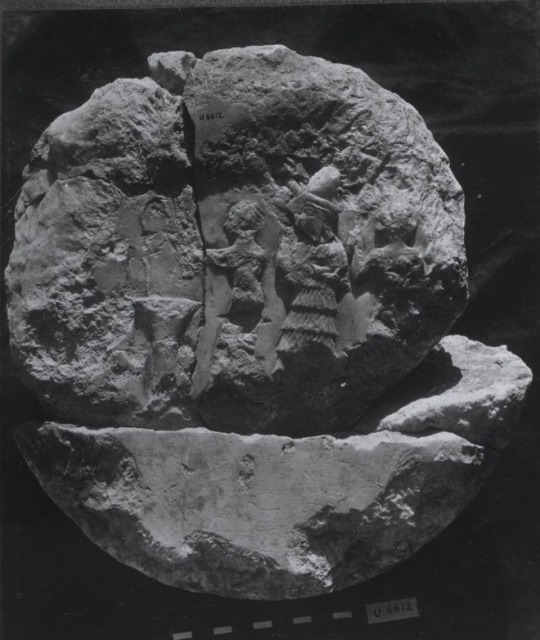
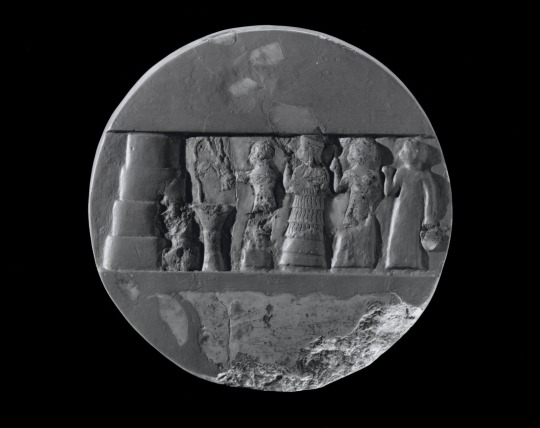
🔹Inana's Importance🔹
No doubt Sumerian Inana and Akkadian Ištar was one of the most important Goddess throughout Mesopotamia and eventually neighboring regions. Many local Goddess were identified with her at various dates (even if originally separate).
But was Inana actually placed above all other Gods?
Yes, in two literary compositions (as of right now). The Exhaltion of Inana & Inana C. Two literary compositions do not equated to the 3000+ year history of Mesopotamian religion and I wish more people who wrote on this topic acknowledged that.
To be the "Queen of all the me" was to hold the cosmos in one's palm. Crucially, this was not a universally accepted view of Inana. Though she was of course a celebrated goddess in Sumerian culture, she was generally considered inferior to the main male deities of the pantheon: Enlil, An, and Ea. The Exaltation sets out to change this by making Inana supreme among gods, and this aim is emphatically announced in the first three words of the text. [11 page XIX]
It is often stressed that the plethora of myths & hymns from cultures with more literature available (and popularity) such as Greece & Rome do not always reflect the totality of their ancient beliefs—it is the exact same situation when it comes to Inana.
Ištar was risen further than Inana in terms of widespread importance discussion on that here — Link. But that is long after Enheduana
🔹Better Source for Enheduana🔹
If you want to read these same hymns in a way that is presented for a modern audience I suggest the version done by the Assyriologist Sophus Helle, who has a passion for Edheduana, in his book "Enheduana: The Complete Poems of the World's First Author"
Google Books — LINK
Companion website to the book - LINK
Enheduana on his personal website — LINK
Helle actually has Maedor's work listed in the bibliography of the companion website (albeit I read the entire website and can't find where it is used) [9.2], but translations coming from an actual Assyriologist are a better option for those who want to know Inana.
On each of the companion pages��The Exaltation, The Hymn, and The Temple Hymns—he mentions other translations of the literary compositions that are also reliable but he never suggests Meador's translations. Additionally, his book is 2023, hers is 2000, so his will have much more updated information about Enheduana & Inana, and he mentions that more updated info will naturally continue to come forward.
You can also explore them in a very literal translation on the ETCSL.
ETCSL Inana Hymns— LINK
Exaltation of Inana / Inana B — LINK
The Hymn / Inana C — LINK
🔹Sources🔹
[1] The Two Steles of Sargon: Iconology and Visual Propaganda at the Beginning of Royal Akkadian Relief by Lorenzo Nigro in Iraq Vol. 60 https://www.jstor.org/stable/4200454?seq=1
[2] A Tribute to King Sargon of Akkad by Agulyas from Mott Community College Historical Faculty https://history.mcc.edu/wordpress/history/2014/04/04/a-tribute-to-king-sargon-of-akkad/
[3] Ancient History Source Book: The Legend of Sargon of Akkadê, c. 2300 BCE from Fordham University https://sourcebooks.fordham.edu/ancient/2300sargon1.asp
[4] 095. Tell Maqayyar (ancient: Ur) from Colorado State University https://www.cemml.colostate.edu/cultural/09476/iraq05-095.html
[5] Sargon of Akkad: rebel and usurper in Kish by Marlies Heinz http://faculty.uml.edu/ethan_spanier/Teaching/documents/CP2.0HeinzSargonofAkkad.pdf
[6] Handbook to Life in Ancient Mesopotamia by Stephen Bertman.
[7] Nanna/Suen by Adam Stone at Oracc and UK Higer Education Academy http://oracc.museum.upenn.edu/amgg/listofdeities/nannasuen/
[8] A Dictionary of Ancient Near Eastern Mythology by Gwendolyn Leick
[9] Enheduana . org "Authorship" https://enheduana.org/authorship/
[9.1] "Disc of Enheduana" https://enheduana.org/disk-of-enheduana/
[9.2] "Bibliography" https://enheduana.org/bibliography/
[10] Penn Museum https://www.penn.museum/collections/object_images.php?irn=293415
[11] Enheduana: The Complete Poems of the World's First Author by Sophus Helle
I have a working draft on the Inana's importance section, that I removed from this post because it was getting too long and off topic. Will I finish it? Literally have no idea.
Originally written February 9th, 2020, complete overhaul in 2024 due to access to Helle's commentary and resources. And wanting to be more concise. So I don't think this counts as a repost 😬.
#polytheism#paganism#landof2rivers#levpag#queue#michibooks#enheduana#enheduanna#sumerian#inana#inanna#lady of the largest heart
19 notes
·
View notes
Photo
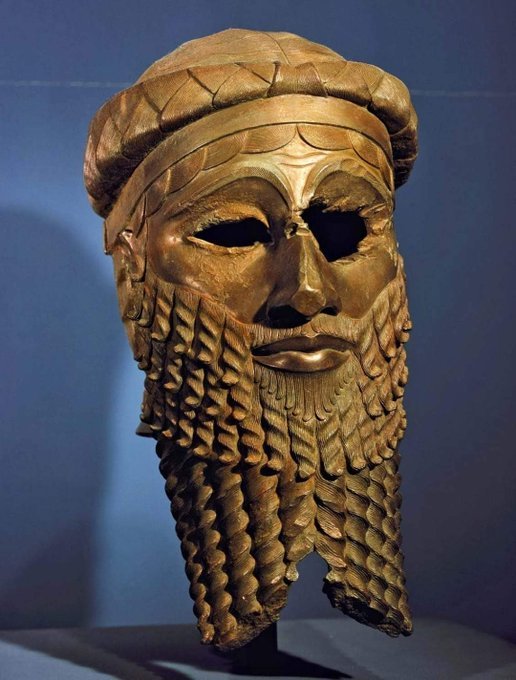
Bronze Head of a King, perhaps Sargon of Akkad, from Nineveh (now in Iraq), Akkadian period, 2300 BC; in Iraq Museum, Baghdad.
70 notes
·
View notes
Text
LUNDInium Outskirts /but it's her insane doodles/ PART IV
Me: *Casually watching my operators work on ZT-7 farming* Me: *Looks away for a second* Lessing: "Du kannst rennen, aber ich werde weiter jagen." Me:

I forgot I set all the Leithanien characters to German the day before...
--- Me: *In the base* Poz: "Doctor, if you insist on spending time together, how about we talk about your favourite books?" Me: *Pushes everything off my desk to clear space* "You just need to ask!"
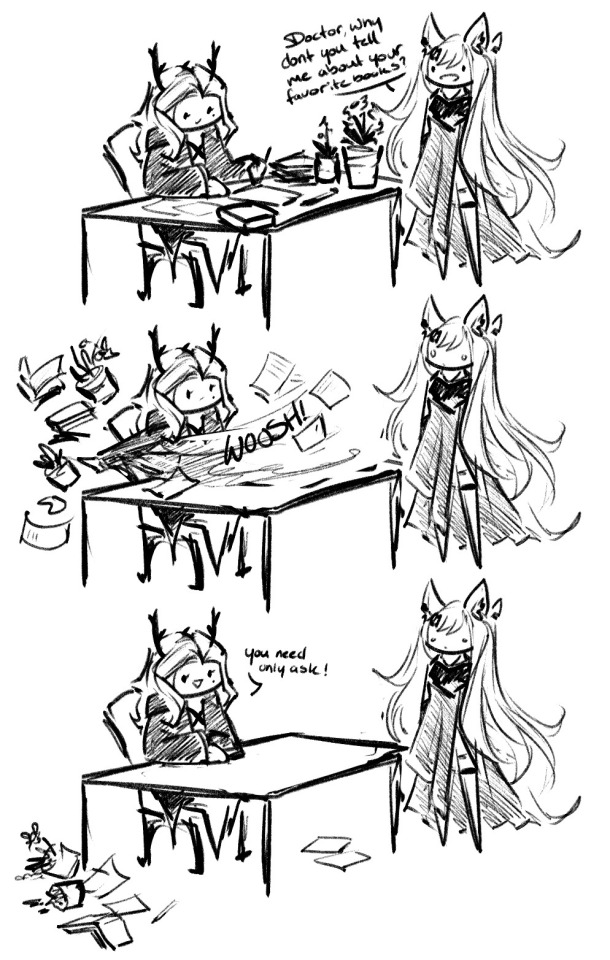
--- There is no doodle for this one, but since it's HorseUncleTM merch, I wanted to show it off because the last part didn't actually feature what I was shown and how insane it looks knowing she has her entire desk COVERED with them.
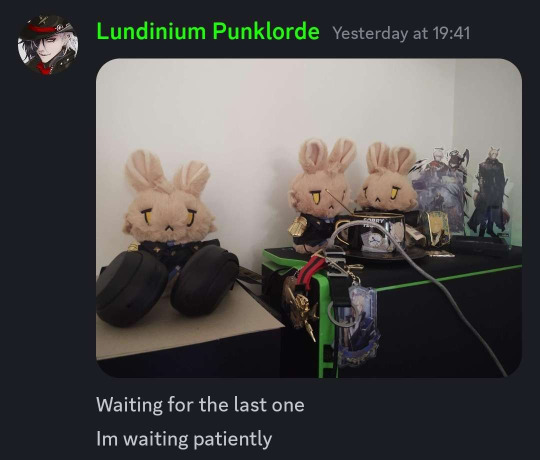

---
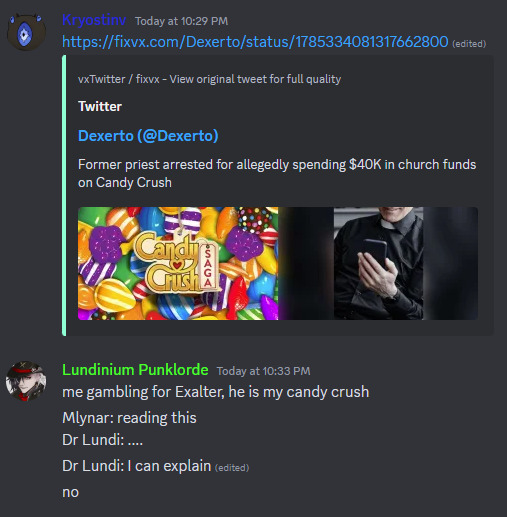

How is RI-13 not broke yet living in holes, who knows...? Perhaps the rumours are correct and Dr. Lundi really dealing secretly with firearms on the black market of Sargon. ---
The event of Dr. Lundi half-crying on the bus back home because she couldn't stream to us BUYING the SKIN will be a core memory created based on eternal friendship. I will never be happier to wake up than I am when I see an 'Eve, can I be soggy again?' before being bombarded with Mlynar details and ramblings regardless of what I say.

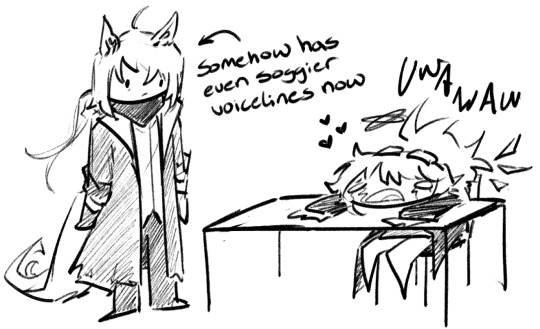
There's a lot to unpack but I can't possibly ever talk about Mlynar the same way Lundi does in VC. She pulls up receipts proof of her words as well every time she mentions something.
--- We also have a new Pinkie sticker! Wahoo team!!!


Based on this --- Based on this post about our Arknights Yumeship's kid being bullied, I had a little spiral and was just thinking about different scenarios. Out of all the answers given, Kryo's is most direct and... very in character towards his sarkaz/draco child.

Lundi's also leaning towards physical aggression, instant retaliation for their little baba horse.

And then I just... imploded... (This was on the basis of the parents trying to justify their child's behaviour)
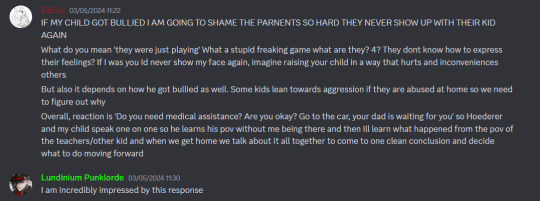
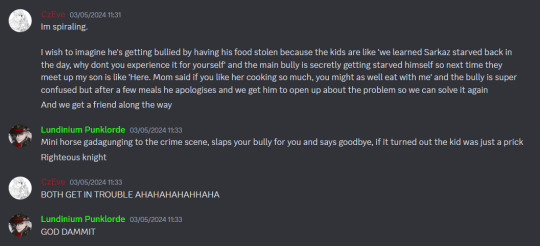

While Pinkie is not too interested on the aspect of children we've been trying to involve them more in the Yumeship questions just because their relationship with Swire/Chen is SO wholesome but they're shy to actually indulge. It's alright, we will always be there for the sugarbaby ultramind that is our friend.
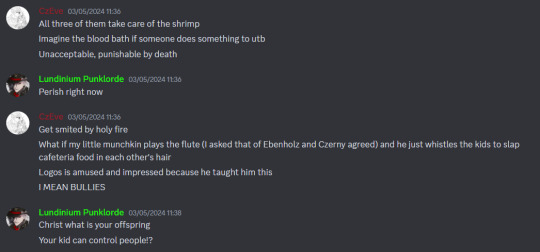
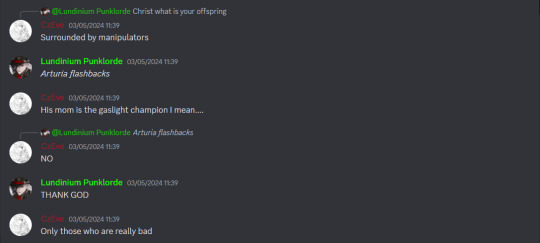
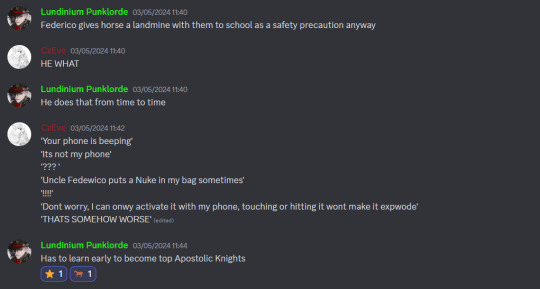
You can see this conversation was very important to me.
Which is why this ART IS SO CUTE IM CRYING I LOVE THEM
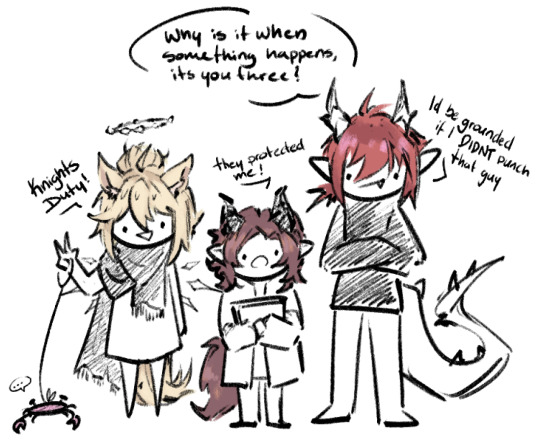
---
Vigorously searched for the video, but basically, me and the Team were watching Unusual Memes from this one channel and one of them was of a guy who walked up to his neighbour/friend's home camera and said 'Well, you DON'T get to decide when to party, I want you around now.' And well... if that isn't Lundi pulling Dr. Eve out of bed during some of her emotional episodes.
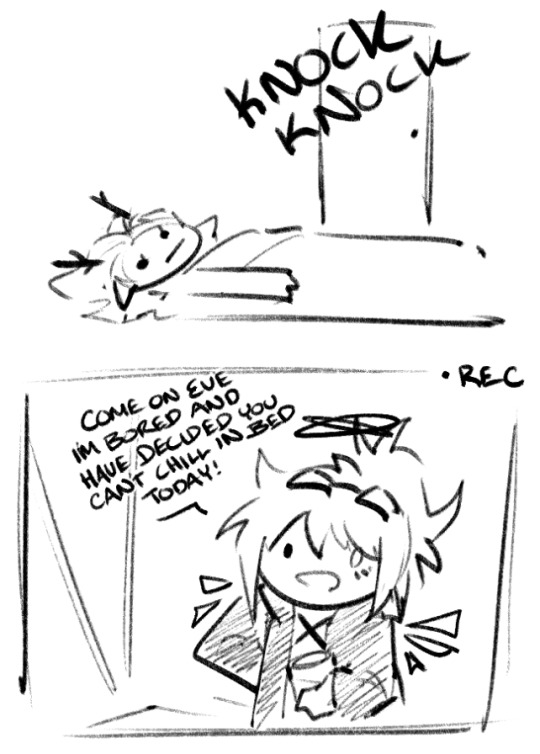
In reference to this, Dr. Pinkie was upset Lundi wasn't just breaking down my door because she usually does that without asking. So some edits were applied and a part 2 has been added:
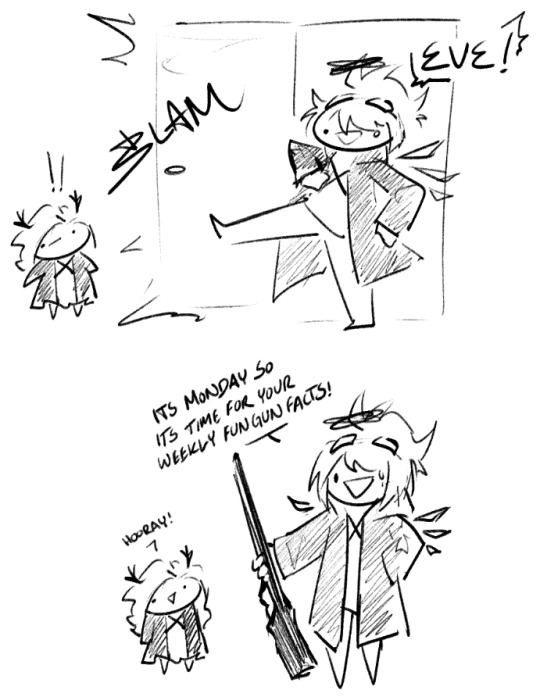
We all loved everything about this. Thank you Pinkie for always being some of the best designers and always editing things in the funniest way possible.
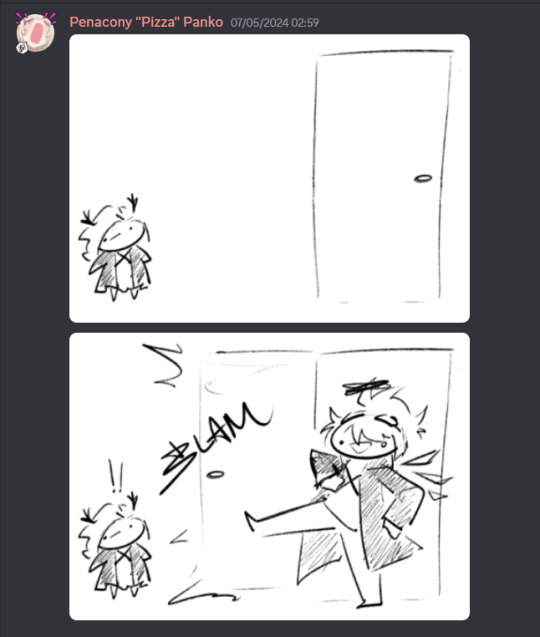
Me: "It looks like I'm getting kidnapped." Lundi: "Child napper."
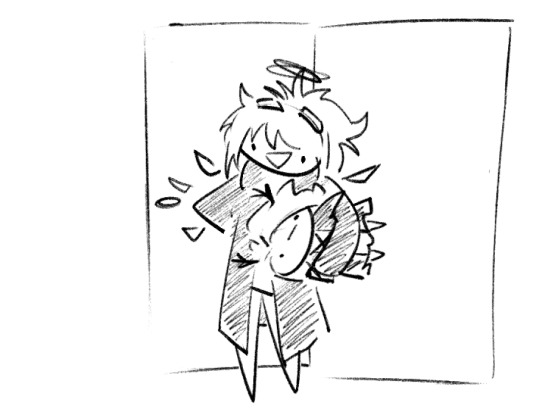
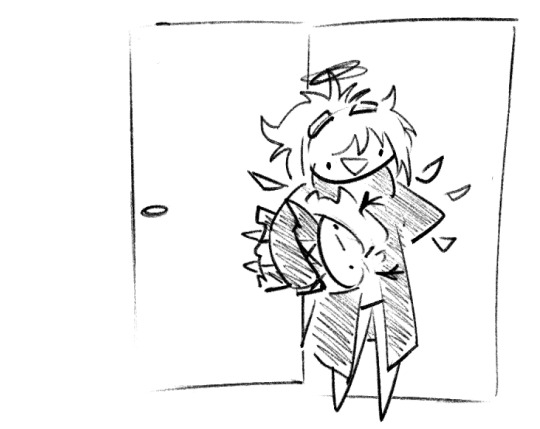
... ... ... I JUST NOTICED THIS GIF WAS CREATED??!?!?!?!?!?!?

I'M GETTING TURNED INTO SOURDOUGH HELP ME --- Pinkie stealing Dr. Lundi's food.

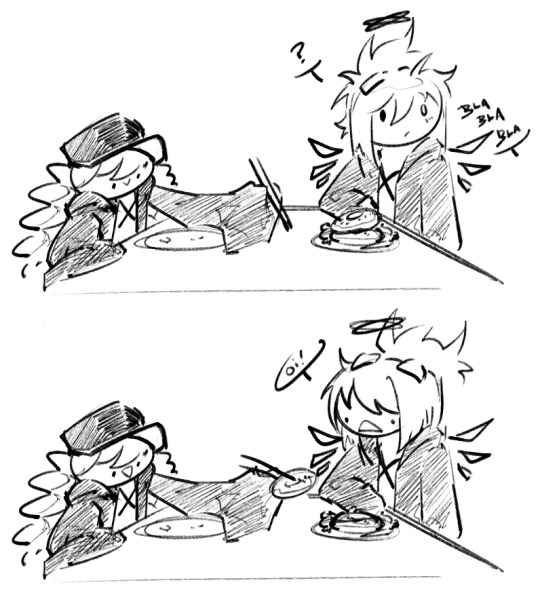
--- God forbid I ever sneeze in call
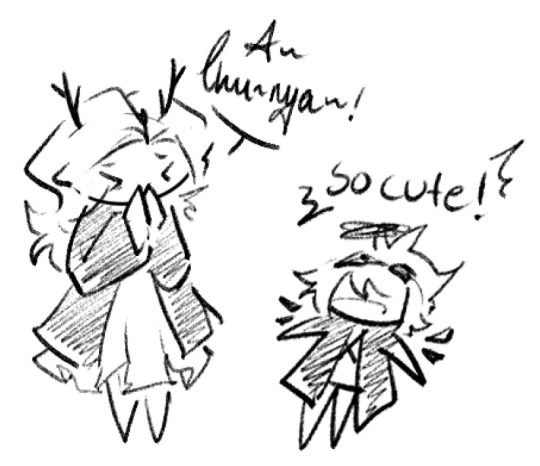
--- And as some of the final doodles there's for this part, allow me a little TW about bugs because I am absolutely terrified of this thing and I am afraid that its arms are longer than mine so I can't even come into reach to kill it.

It's not my fault people make shelves so high up.

#arknights#doctor of ri shenanigans#arknights event#doctor arknights#friendship#friendship banter#memes#arknights gacha#doodles by Lundi#I do not draw any of this#mlynar arknights#arknights pozemka#arknights yumeships#arknights executor#Dr. Lundi#Dr. Eve#Dr. Pinkie#Dr. Kryo
18 notes
·
View notes
Text
Ascending Mount Qaf
Prince of Persia is a franchise I have faithfully followed since childhood. While I was predominantly occupied by Kingdom Hearts and enjoyed many of Sony's mascot games including Jak and Daxter, Ratchet and Clank, and Sly Cooper, there was something about Prince of Persia: The Sands of Time that immediately captured my interest. Although I didn't begin playing it from the start, as soon as I got Prince of Persia: The Two Thrones on my PlayStation Portable, I was sucked in. Especially given how athletic the Prince was as he darted in and around against his foes, absorbing the sand from his enemies and having access to time powers. These concepts blew little Kyndaris's mind. And if Blinx had ever come to PlayStation, I would have gobbled up those games just as readily with all the others.
Since The Two Thrones, titles for the Prince of Persia has been few and far between, with only a reboot game and then the Forgotten Sands entry. After all, when Assassin's Creed and Far Cry can make Ubisoft buttloads of money, there's no need to introduce a competitor to your primary money-making machine.
All that changed with the shock announcement of the Sands of Time remake. Unfortunately, the title has been delayed. Perhaps indefinitely. To ameliorate the discontent of gamer's everywhere, we were bequeathed Prince of Persia: The Lost Crown instead.

This game, unlike the 3D titles that captured the hearts and minds of many, is a metroidvania-style game where you are thrust into the shoes of Sargon, a member of the Immortals. After the prince is kidnapped, Sargon and the Immortals set out to rescue him on the mythical Mount Qaf and find themselves trapped in a place where time no longer flows as it once did.
Along the way, Sargon unlocks special abilities by collecting Simurgh feathers and faces off against alternate versions of himself. About a third of the way through the game, Sargon catches up to Anahita and the Prince, only for the leader of the Immortals, Vahram, to murder the prince and throws Sargon from a cliff. After surviving the fall, Sargon seeks a way to go back in time to stop Vahram.
Although Sargon is successful, he loses Anahita in the process. As he battles against Vahram, he learned the leader of the Immortals is the long lost son of King Darius, the previous king of Persia who was assassinated by Thomyris. Despite this slight, Vahram does not seek the throne. Rather, he hopes to ascend to godhood and remake the world in his vision.
The rest of the game sees Sargon seek to stop the mad Vahram. It all culminates in a battle atop Mount Qaf, harkening a little to almost every single Japanese role-playing game where the last boss is always a God, or someone who tries to claim such powers. By game's end, I did wonder if I had somehow stumbled into a Tales of or Final Fantasy title.
Of course, Vahram's redesign as Time and Space (a terrible name for a God. Perhaps try Bhunivelze? ? Maybe throw in a full Latin choir to chat throughout the entirety of the boss battle just for kicks) was a little lacklustre in my opinion.
Perhaps it's how often I've seen such stories play out that I was hoping for a little more spectacle.



That's not to mention all the plot holes scattered throughout the game, like how did young Vahram initially escape Mount Qaf in the first place to found the Immortals. If he was trapped on Mount Qaf (and players do see versions of him throughout the main story - with Sargon even helping him), why is there another version of him who is too far gone? And where did the alternate Sargons come from? When I first stumbled upon them, I was a little confused as to how they came into being. Perhaps if there had been more exposition on these phenomena, it would have made more sense.
Then there is the fact that Sargon went back in time to save Prince Ghassan. However, Menolias and Orod are apparently still dead.
Not to mention the prophecy of Mount Qaf which alludes to three Princes rather than two. And the way Thomyris allows her son, Prince Ghassan, to walk away from the throne but was more distressed when Sargon, too, left after the revelation she had usurped the throne from King Darius.
These aside, my main gripe with The Lost Crown is the tight timing when it came to parrying attacks and the punishing extra damage. Throughout most of the game, I relied more on dodging instead of relying on parries although the game does encourage such use through the amulets Sargon can equip for use.
Maybe it was simply a matter of me learning enemy patterns but I simply did not have the patience, given how risky it was.
Notably, as well, was the platforming. True, I should probably try and start to 'get good' but it's frustrating when Sargon has so many abilities and one needs to keep all of them in mind as he jumps and backflips his way through, while also crisscrossing into the unseen world to navigate his way through the Citadel. Especially given where these abilities are mapped to.
Like, I know what I'm supposed to do, but my over 30 reflexes no longer work as intended. That, or I mispress something and do something that ruins my entire run although I was just a platform away from being on safe ground.


Very frustrating.
Nobody wants to waste forty minutes trying to desperately get a King Xerxes coin. Still, it's a learning experience. And every failure is a step forward...
...is what I would say if it wasn't so rage-inducing.
This is exactly why I don't play Soulsborne games for fear that I'll always be so close to victory but have it snatched from me in the last moment.
And I simply don't have the time to keep retrying and retrying.
Well, maybe I do, but the perfectionist in me would have me throwing myself at the problem until the wee hours of the morning if I can't get it, and it still wouldn't be satisfied even if I did pull it off. There is no dopamine rush. Only stress and adrenaline that leaves me shaking.
Anyways, I can still see why gamers would still enjoy The Lost Crown. And it is a great game that has been fine-tuned for those with the skills necessary to take out all the challenges the developers have concocted. While it did prove a little frustrating to me in the later stages, the game does also include accessibility options for the main path that didn't detract from the game. In the end, it allowed me to see the end of the game and play it as I liked. Without knowing where the next Prince of Persia entry will land, The Lost Crown is still a worthy game to keep gamers busy.
More importantly, it's not another open-world entry with towers to synchronise with.
Goodness, the fatigue is real and is one of the main reasons I skipped out on Avatar: Frontiers of Pandora. That and I never did fall in love with James Cameron's alien world.

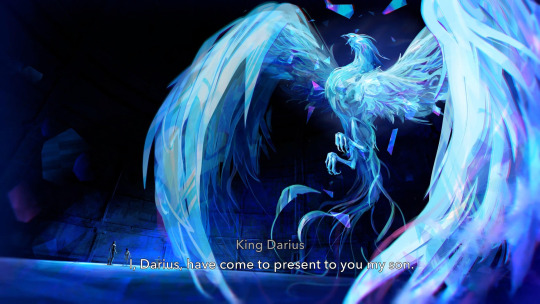

#video games#prince of persia: the lost crown#prince of persia#sargon#vahram#simurgh#time powers#metroidvania
9 notes
·
View notes
Text
Without the staff and the bound spirits within, Sargon could not tear open the earth. Only… Are you seeking change, or just to add a rung below you on the ladder? Nothing words from a child reeking of angels, he had been ready to dismiss, but then Sargon had looked in the White Knight’s eyes and seen faith.
It had burned then and it burned now.
“So I wonder,” Sargon murmured, “have I made the mistakes of my mother, of the Isaru?”
Had he thought himself the master of his Greed, only for it to poison him unseen? It had all begun in that moment, he often thought, when the Spirit of Fire burst through the ground. And oh, how Sargon had wanted it.
“How many of you did I take?” he said. “Dozens. I called you and bound you, hung you from my staff like ornaments.”
And now that he no longer had the strength, now that he thought of those clear eyes and burned with shame, Sargon wondered if he’d ever mastered anything at all. He breathed out and his Words unfurled, resonating with Creation, and he felt the call to the Deeps being heard. As a child, Sargon Isaru had seen the face of Greed.
Perhaps he had been a child still all these years, to be facing it only now.
“Please,” the Herald of the Deeps said. “I cannot bind you, cannot master you.”
His fist clenched. And he never would again. He would not keep making rungs below his own.
“I can only ask,” Sargon whispered. “So please – help us.”
His words sunk into the Deepest Sea, below the burning waves, leaving only ripples. Sargon waited, watching and hoping. The depths remained dark.
And then they shook.
Like an anthill kicked, the dead began to swarm. The ground below them cracked, split, the earthquake shattering the stone. And light came, of light came when magma erupted in a fountain. Dead burst into flame, ran, as the Spirit of Fire roared its wrath. A small one, young, and still Sargon felt his throat tighten with shame and joy. It had come. He had not deserved it, but it had come. His Words rang again, and the Spirit of Fire sang back.
“Yes,” Sargon said with a smile. “Together. Let us teach them who the deeps bel-”
The depths shook again. He froze. And again, and again, and again, until the darkness below Keter burned red as the ancient scream of Spirits of Fire shattered stone. Small and large, old and young, they had come. Not one but dozens. And as magma swallowed hundreds of dead, as the air filled with twisting heat, the burning waves shivered. Something was swimming below. An old one, the leviathans of the Deepest Sea. And when it burst free, turning stone into flowing rivers, Sargon stilled. For he had seen it before, this Spirit of Fire. Long ago, when he took the first step down a road.
“Beginning,” the Herald of the Deeps softly said, “to the end. Were you with me all along?”
A song, a harmony more beautiful than anything he had ever heard. And when Sargon Isaru looked at the ancient spirit, he saw beauty again – but nothing more. The Greed was gone, and the Herald wept. The Spirit sang, comforting, and he laughed through his tears.
“No,” Sargon told it. “They are good tears.”
We can learn, he thought. We can do better.
“Then let us,” the Herald of the Deeps smiled, and his Burden unfurled like a flower under the sun.
His hands rose and the Deepest Sea rose with them, devouring armies whole.
31 notes
·
View notes
Text
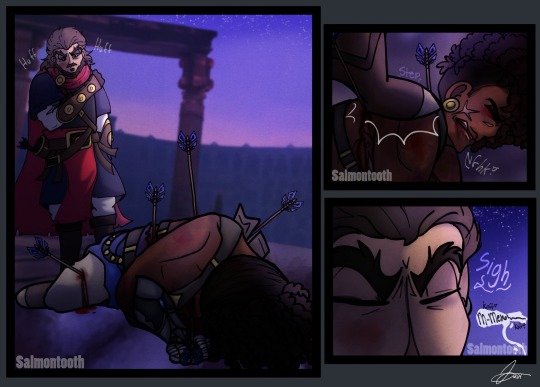
@gryffintheparrotcat brought to my attention that Menolias manages to kill Sargon in an alternate timeline, so I knew what I had to do
Read more for a little drabble I wrote!
SPOILERS FOR POP: THE LOST CROWN, GRAPHIC DEPICTIONS OF VIOLENCE, MAJOR CHARACTER DEATH
Menolias knew he should’ve missed. Sargon was light and quick on his feet, making him nigh impossible to hit. But, somehow, the arrow Menolias had fired from the air had found its mark. Perhaps it was the mountain that made the Rashabar slow and sluggish with exhaustion, or Menolias needed to have more faith in his archery skills. No matter the cause, the effect of his actions played out in front of the Immortal.
Menolias watched in a disbelieving haze as the arrow head buried itself into Sargon’s torso, causing the traitor to curl in on himself in a muffled cry of pain. Menolias quickly snapped back into a combat mindset and notched another arrow as he fell back to the earth. He fired. And then he fired again. And again. And again. All of the arrows found their target, hitting Sargon in the back, shoulder, leg, and chest, causing the young man to fall to one knee. These shots would’ve killed an average man, but Sargon had athra flowing in his blood, and he still stood. However, athra was only useful if the blood was still inside the person, and not spilling out onto the ground.
Sargon, with wavering steps and harsh breath, charged with a furious yell as soon as the archer landed, clearing running off adrenaline, and in an auto-mode mindset. But the arrows slowed him down and the injuries he suffered hindered his footing. It was almost too easy for Menolias to roundhouse Sargon, his foot slamming into Sargon’s jaw and sending the Rashabar flying away from him.
Sargon hit the ground with a sharp cry, the momentum of Menolias’s kick causing him to slide across the cobblestone before coming to a jarring halt. The Rashabar didn’t get back up. But he was alive; Menolias could see (and hear) his wheezing breaths, his sides and chest heaving as he struggled to intake enough air. Menolias crept closer, but he holstered his bow. He knew Sargon was in no condition to continue fighting him. Menolias doubted Sargon would be able to get up even if he wanted to.
As Menolias loomed over Sargon, he felt a twinge in his chest. Despite everything, despite the betrayal, despite the hurt, Menolias had a fondness for Sargon. Sure, the kid was cocky and arrogant at times, but he had a certain charm he brought to the Immortals. This man (still a child when he joined their group) had changed Menolias’s life, and the older Immortal couldn’t truly imagine a life where Sargon wasn’t in it. But here they were, with Sargon bleeding out at Menolias’s feet. His breaths were beginning to whistle in his dry throat, and his wheezing had quieted down to light gasps.
Menolias planted a sturdy boot on Sargon’s shoulder, and the traitor winced from beneath him, a small pained noise slipping out from his clenched teeth. He had his eyes screwed shut, his brow furrowed in agony as the arrows bit into his flesh.
He coughed harshly, blood starting to seep from the corner of his lips. From his experience in battle, Menolias knew one of the arrows must’ve hit a lung, or at least nicked it. It was the most pathetic Menolias had ever seen Sargon. He didn’t look this pitiful even after his fight with Vahram all those years ago.
So, they stayed there in the falling twilight, Menolias keeping his foot on Sargon’s shoulder in an attempt to keep him down. But it was all for show; Sargon wasn’t getting back up. He couldn’t. Menolias actually didn’t know why he had planted his foot down; maybe out of habit with enemy soldiers? Or maybe this was the only comfort he could give as the young man slowly slipped away from the land of the living. Silence blanketed the two, besides for crickets beginning to stir and Sargon’s wheezes starting to fade.
Menolias wanted to scream in that stillness. He wanted Sargon to say something- anything! Why did he kill Ghassan? Why would he betray the Immortals after everything they’ve been through together? We loved you! Menolias cried within his mind. “We took you in! We were your brothers! And this is how you repay our kindness?”
Of course, he got no answer. But then, Sargon coughed, his entire body shaking as he dislodged blood that had clotted at the back of his throat.
Then, he whispered, in the most broken tone, “M-Menoli…”
Sargon’s voice gave out, and he left his last word unfinished. Menolias had seen enough death to know what it looked like; Sargon was dead. Menolias sighed, squeezing his eyes shut as he felt a stinging sensation. Vahram would admonish him for showing grief for an enemy. Even if that enemy was someone he had loved like a brother.
Menolias lifted his foot off the boy’s body, and he dropped to one knee. He gently stroked a dreadlock away from Sargon’s eyes; he knew it did no good, since he was going to leave Sargon’s body there for the vultures to fight over. Then, in a low tone, he whispered to the night air, “I never wanted this fight… I am sorry, little one.”
With that, Menolias turned away and began to leave the palace. Vahram would be pleased to hear of this victory.
#my art#prince of persia#prince of persia the lost crown#sargon#Menolias#prince of persia: the lost crown
12 notes
·
View notes
Text
Decorative object—Nimrud, Mesopotamia, 8th century BCE

According to the Met: "This curved object, carved from a thick piece of shell and decorated with a guilloche border, was part of a group of 18 similar pieces found in a well in the Northwest Palace of Ashurnasirpal II at Nimrud. They were probably thrown into the well when the palace was sacked, in 614 B.C. and then again two years later. Their function is mysterious. All were pierced in the center and in some examples, including this piece, a nail remained in the central hole. The nail must have fastened the shell to a backing in some other material, perhaps wood. Other objects found in the same well can be identified as horse trappings, such as the small shell ornaments and studs also in the Metropolitan Museum’s collection (54.117.16-.19). These were probably part of a leather harness, which disintegrated in the well sludge. Horses in the reliefs of the palace of Sargon II at Dur Sharrukin (modern Khorsabad) are represented with similar double-fan shaped ornaments on their bridles, as in a relief in the Metropolitan Museum (33.16.1) showing a groom with two horses. This suggests that the other shell pieces found with the harness ornaments may have also been used for outfitting horses, perhaps affixed to a chariot as decoration. Because of the close parallel with the reliefs from the palace at Dur Sharrukin, the equestrian harness elements from this well probably date to the time of Sargon in the late eighth century B.C. At this time, the Northwest Palace was primarily used for storage rather than as a royal residence."
5 notes
·
View notes
Note
great post on reddit, and prudent judgement for not leaning on the parallel as much as you did in a recent tumblr chain. but for the parallel to be faithful to the real world, while fighting sarkaz themselves, laterano should possess a vast network of ngos and dual-citizenship sankta in positions of power in other countries who preach that it's a moral and practical necessity for every other country except for laterano to take in unlimited number of sarkaz. also, in that parallel theresa should have been stoned to death in her youth because reformation is explicitly prohibited for them.
I publish a lot of posts in r/Arknights, so you'd have to be more specific. Especially since, even if my most recent one did involve both the Sankta and Sarkaz, I did not at all have real-world religions in mind.
Because I don't see the Sankta or Sarkaz as strictly parallel to anyone. The Sankta have some parallels to both Christians and Jews, and the Sarkaz have other parallels to Jews as well as to Muslims. They also each have a number of unique influences (such as the Myriad Souls and halo-empathy) which are parallel to nothing.
Furthermore, Arknights also has other parallels to Muslims, such as the Sargon warlords who invaded and conquered Minos and who continue trying to retake it after being driven out.
(The lineage of Sargon lion-kings who invaded and conquered Victoria has only the most thin and tortured parallel to Christianity's journey from the Middle-East to the British Isles. In no small part because Arknights has neither a Roman Empire nor any true parallel to Christianity.)
The Iberian peninsula of Arknights has its own parallels to the Jewish immigrants (in the form of the highly-educated, high-achieving Aegir) and the Muslim invaders (the Seaborn), with the Inquisition ferreting out traitors among the first and driving out the second.
On that note: With the caveat that I think theories about conspiracies are not automatically crazy, the specific conspiracy theory you mention does find a parallel in the Cultists of the Deep in Iberia.
Notably, not all Aegir were cultists, and not all cultists were Aegir. A native Iberian bird-woman was enthusiastically working with the cultists of the fish-people to betray her nation to the sea-monsters.
Her motives were strictly anti-human and genocidal. Though if the Seaborn had been more like actual Muslims rather than an alien swarm of all-devouring beasts, she might have betrayed her ethnic kind for materialistic self-profit.
Also, another Iberian bird-man tacitly supported her, to a point. He didn't want to see his people destroyed, he just wanted revenge against his government and was misguided about his strange ally. A useful idiot who was, otherwise, a fine father and upstanding leader of the community.
Meanwhile, the Tin-Man who seems to lead Columbia's version of the CIA seems to retain something of a dual-citizenship with Kazdel. He clearly still cares greatly about his fellow Sarkaz. Yet his primary loyalty is to Columbia, which he perhaps sees as a superior home for the Sarkaz compared to Kazdel. A place to break free from the past and become something better.
Nasti, another dual-citizen, owes more loyalty to Kazdel. But rather than betray or sabotage Columbia, she merely learned all she could from it so that she could return to her true home and make it a better place.
6 notes
·
View notes
Text
youtube
It's pretty easy to gloss over, especially when you're also trying to figure out the tutorial, but Fire in the Sands doesn't have you playing as Rhodes Island; you represent an unnamed Sargon village that was destroyed by Catastrophe and forced to relocate. It's also presented as such in dialogue, in character storylines, and in the sheer absence of any mention of RI.
(While we do use our usual operators, that's a necessary conceit of the game. Perhaps we shouldn't read too much into how strong the raiding parties are either...)
I appreciate that they've taken this route. It's pretty easy to get games of this style that are either explicitly or implicitly colonial, where you're striking out into "new" territory to build your sovereign realm and getting into conflict with whoever already happens to be here. In particular, AK's existing assets bound them to make the gamemode conflict-heavy against human enemies.
By having you explicitly play as a local settlement displaced by natural disaster, they avoid making it so colonial and instead head for AK's preferred themes — so now the final boss is a tax collector from the unquestionably more powerful Lord Ameer, trying to push you off the oasis you settled.
Interestingly, the game doesn't aim to represent you as "the good guys" too heavily. While the raids and Mountain Passes are generally bandits or tax squads, and Basil takes the time to stress how cool you are with Infected, there are at least a couple of nodes where you're raiding a neighbour's farmland, and more than a few that are straightforward resource conflicts. You also extort/blackmail your Liaison pretty badly (under duress yourself, yes, but it's still hardly heroic behaviour). Your justification is simple survival, and it doesn't seek to sanitise what that asks of you.
Arknights certainly isn't perfect when it comes to representational/portrayal issues, particularly when it comes to Sargon, but I think it's clear that when it comes to economic/material issues they do try to handle them effectively.
20 notes
·
View notes
Note
A: Greetings Consul. Your words from earlier made us curious.
Though I can infer what some of them would be I think, do you happen to have a list of the top ten most spoken languages on your planet?
Z: Additionally, are there any notable extinct or near-extinct languages?
At one point, the most-spoken was Ægirian. I expect this is no longer the case. Soon enough, Ægirian may be extinct, if the present trajectory holds.
Though we don't have actively available statistics, as the censuses of the largest nations are not public information, the most common language on the land would likely be Lung Yanese or Victorian. Lung Yanese is spoken predominantly across the Great Yan, and is a common trade language spoken by businessmen who frequent Lungmen, perhaps the foremost economic center of the mainland. Victorian is spoken in both Victoria and Columbia, and is a common trade language for the same reasons. After these, Leithanian is a likely third, owing to its former colonies, such as Bolívar—though Bolívar itself predominantly speaks a dialect of Iberian, which I'd place as fourth. Padishah's Sargonian is a good guess for the fifth, given the size of their empire, though only third because of the sheer number of languages spoken as a primary language in Sargon, and the lack of central dominion over much of their territory. Ursus might exceed the number of primary speakers. Past those, I'm unsure of where they rank. If every Sarkaz spoke Kazdelian, it would easily be a top three language on the land—but I doubt the actual percentage is anywhere close to 100. Similarly, Lateran can be seen worldwide—but its actual speakers are typically only clergymen, so it may not even make the top 10. Siracusan is still spoken in many places in Columbia. Kazimierz is a large enough territory that I'd feel somewhat comfortable placing its language within the top 10, though it may honestly be beaten out by another dialect of Yanese. I doubt that Gaulish makes the top 10 anymore, as it's spoken as a primary language in no current nation, but there may well be enough existing pockets of it to push it over the line. It isn't yet extinct, but I expect it to begin to disappear within the next few generations.
As for extinct languages, you'd be better off asking Kal'tsit—though she may be too busy to answer. History of the land is not my forte; I've only been here for a handful of years.
4 notes
·
View notes